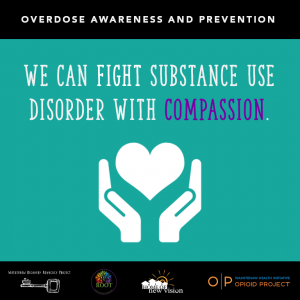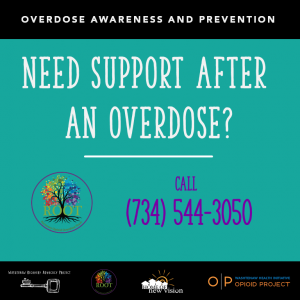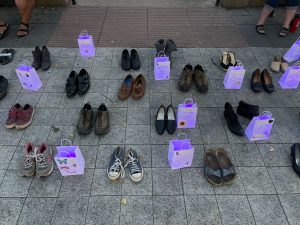 This August, the Washtenaw Health Initiative’s Opioid Project hosted a weeklong social media campaign leading up to International Overdose Awareness Day—a day meant to raise awareness about overdose, reduce the stigma of drug-related death, and acknowledge the grief of families.The group pulled together overdose awareness and educational materials—with a focus on harm reduction messaging and resources. These materials were distributed to the Opioid Project’s partner organizations to share through their social media platforms, as well as through their new Facebook page.
This August, the Washtenaw Health Initiative’s Opioid Project hosted a weeklong social media campaign leading up to International Overdose Awareness Day—a day meant to raise awareness about overdose, reduce the stigma of drug-related death, and acknowledge the grief of families.The group pulled together overdose awareness and educational materials—with a focus on harm reduction messaging and resources. These materials were distributed to the Opioid Project’s partner organizations to share through their social media platforms, as well as through their new Facebook page.
The campaign was co-sponsored by Opioid Project member organization Home of New Vision— a Washtenaw County-based substance use disorder treatment provider that offers short-term crisis intervention, clinical services, recovery housing and other recovery support services.
One of these services is through Recovery Opioid Overdose Team (ROOT), a collaborative peer and care navigator team that engages overdose victims early in their recovery process. ROOT focuses on people who have been involved in an opioid overdose, rescued by naloxone, then transferred to a local emergency room for follow-up care. ROOT ensures that these individuals are connected to the support they need post-emergency department release—providing a warm handoff to treatment or other resources.
Another service housed at Home of New Vision is the Washtenaw Recovery Advocacy Project (WRAP), a Recovery Community Organization (RCO) consisting of people in recovery, family and friends of recovering persons, and other allies. The group promotes recovery through multiple strategies including public education, policy advocacy, and peer-based recovery support services.
On the evening of August 31st, International Overdose Awareness Day, the partner organizations hosted a remembrance ceremony at Liberty Plaza in downtown Ann Arbor. Brianna Dobbs is the ROOT coordinator at Home of New Vision who helped plan the event.
“With our community celebrating September as National Recovery Month, we wanted to first remember those who we have lost while recommitting to our fight to end overdoses,” says Dobbs. “At the end of the day, people who have died can’t recover.”
The evening’s events included education about local substance use disorder programs, as well as naloxone and overdose training. Kristal Reyes, a WRAP advisory board member who also attended the ceremony, notes that “opioid overdose is 100 percent preventable” with the right training and supplies.
“Having naloxone equips you to reverse overdoses,” says Reyes, “and is free to get for anybody.”
There were also multiple speakers—including those in recovery as well as those who have lost a loved one to an overdose. One of these people was Kim D.
“My son wasn’t so lucky,” she recounted to the audience. “He lost his life to opioid overdose on December 4th, 2020. This is my first time telling his story, but I hope it’s not my last.”
The event concluded with a memorial moment and luminary, dedicated to those who’ve lost loved ones from an overdose. The group created an exhibit of 82 shoes—each representing a person in Washtenaw County lost to overdose in 2020.
Memorial remembering those who we have lost to overdoses.

